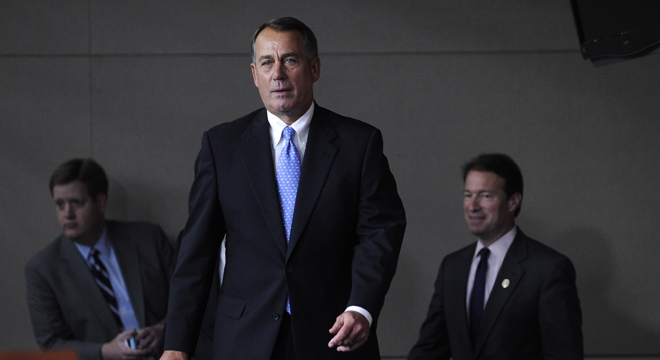Facing emboldened Democratic negotiators and a quickly thinning legislative calendar, House Republican leaders have offered to extend the payroll tax holiday through the end of the year without paying for it. The development represents a dramatic reversal for GOP leaders, who nearly allowed the payroll tax cut to lapse in December in part because of their insistence that the package be financially offset.
“Because the president and Senate Democratic leaders have not allowed their conferees to support a responsible bipartisan agreement, today House Republicans will introduce a backup plan that would simply extend the payroll tax holiday for the remainder of the year while the conference negotiations continue regarding offsets, unemployment insurance, and the ‘doc fix,'” said GOP leaders in an official statement Monday afternoon.
That’s a huge concession to legislative and political realities, and a tacit admission that Republican leaders desparately want to avoid another no-win fight over renewing a tax cut that overwhelmingly benefits the middle class.
As it stands, Republicans are poised to become the face of a middle class tax increase if the holiday expires. And they know it.
Aware they hold the upper hand, Democrats have refused to finance the tax cut — $100 billion over 10 months — on GOP terms. That’s left Republicans with three bad options: pay for the cut at least in part by raising taxes on wealthy people or corporations, in violation of their anti-tax pledge; pay for the cut using budgeting techniques Republican rank and file members abhor; or don’t pay for them at all.
Given the GOP’s long-standing view that tax cuts for high-income earners need no offsets, they ultimately settled on option three.
But that doesn’t mean their own members will be happy about it. GOP aides have suggested that in the days ahead, the House might vote on a clean extension of the payroll tax cut on “suspension.” That’s a parliamentary maneuver for fast-tracking votes by suspending House rules, but it also requires a two-thirds majority for passage. If GOP members revolt, it’ll be a tough threshold.
“If Democrats continue to refuse to negotiate in good faith, Republicans may schedule this measure for House consideration later this week pending a conversation with our members,” the statement continues. “Democrats’ refusal to agree to any spending cuts in the conference committee has made it necessary for us to prepare this fallback option to protect small business job creators and ensure taxes don’t go up on middle class workers.”
Even if there are over 290 votes for passing the payroll tax cut without offsets, the plan raises several new questions: Can Dem and GOP negotiators find offsets for the other key measures that are also set to expire, including extending unemployment benefits and Medicare physician reimbursements? At about $25 billion and $35 billion respectively, those aren’t easy items to pay for. Would either party allow those other measures to lapse? Will Republicans ultimately cave in full? And how will Senate Republicans — who have filibuster power in their own chamber — react to all of this?
We’ll know the answers soon. What we know already is that Republican leaders have abandoned their negotiating leverage, in recognition of the fact that Dems had them fully cornered. They don’t want the payroll tax cut to lapse, even if a majority of their own members abandon them.










